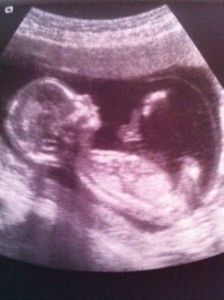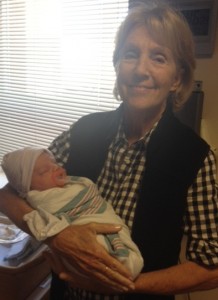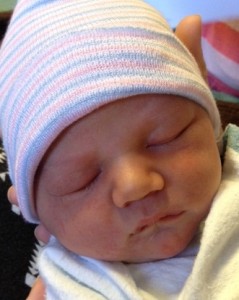In communicating with my children today about their father on this 5th anniversary of his death, several of them asked if I was sad or happy in my rememberng. The accurate answer is “yes”. Sad in wishing Nate was still here, but happy because of a very special photo that came my way via text message.
 Hans and Katy, busy with their young family across the ocean, sent a good report about their unborn baby by way of a picture taken today during their first ultrasound. When I opened the photo, I gasped a bit of delight over the high quality and good angle of this image, the perfect profile of a new family face.
Hans and Katy, busy with their young family across the ocean, sent a good report about their unborn baby by way of a picture taken today during their first ultrasound. When I opened the photo, I gasped a bit of delight over the high quality and good angle of this image, the perfect profile of a new family face.
Hans and Katy’s 5th child, my 10th grandchild, is expected in May of 2015, and seeing that little person so clearly today was a joy that balanced out the lingering sadness about Nate. Rather than having a roller-coaster day of ups and downs, it was a day planted between the extremes. And isn’t that the way God usually does things?
When we receive bad news, it’s often followed by something good. The opposite is true, too, good coming first, and bad after that. Our heavenly Father works at balancing our days, and if we watch for it, we’ll see it. But that part, the watching part, can be a problem. Making note of the bad things is easy. We don’t miss a one. Noticing the good ones doesn’t come as readily. Why is that?
Maybe it’s because in our deepest hearts we think we ought to experience one good thing after another, and when something bad happens, we feel we have every right to object. “Why did God let that happen? How could he be so harsh with me? What did I do to deserve this?”
At the root of our reasoning, though, is a pride that says, “If I was God, I would have done that differently.” In other words, “I think I know better than God on this issue.”
Never.
Admittedly, it’s difficult to accept the bad stuff with a good attitude. I know I’ll be working on that for the rest of my life. Just this afternoon while running errands, tears came while I was driving, when I recognized a way in which I’d acted pridefully toward the Lord by thinking the opposite of the way I should have. I need much more practice, and thankfully God is willing to give it.
And so, as this emotional day ends, God has me solidly in the middle of sorrow and joy, bad and good, sad and happy, in a balance that feels just right.
“When pride comes, then comes disgrace, but with humility comes wisdom.” Proverbs 11:2






